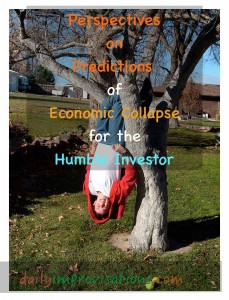
There is one thing for sure, predictions of economic doom and collapse sell news. There are compelling reasons why it is so. There is plenty of obvious evidence of corruption and violence. Surely, collapse will come soon! Civilizations have collapsed in the past, haven’t they? The real answer seems to be relative, for several reasons.
One reason is that in reading history, it is hard to get an accurate sense of how much time it really took for changes in regimes or system to happen. Sometimes, they were definitely more precipitous, like the overthrow of the Czars, but the collapse of the government doesn’t always mean the collapse of the money system. It kind of depends on what you mean by “collapse,” too.
When I read the headlines and the historical accounts, I see the description “collapse” being used very broadly. Some would say that the British Empire has “collapsed,” but the core of the country has basically remained cohesive and operating decently since it’s well published demise. Also, the term “collapse” is used of the stock market in the 1930’s, to refer to dynamics of 1987, and most recently of governmentally induced trouble in 2008. Yet, in none of these instances did the overall framework of our economic system cease to exist and function. Unlike, countries like Zimbabwe, where the government abused its monopoly on the monetary system to the point that their currency became comparatively worthless, and because of the government’s strangle hold on what people were allowed to do economically, poverty ensued. But is that collapse, like a decrepit building crumbles to the ground, or murder? Collapse seems to imply there is nothing that can be done.
Given that the historical accounts are usually preserved by one government, and then retold by another, one has to wonder if much of the “collapse” is merely propaganda, rather than historical fact. One government is always coming along to “rescue” the supposedly helpless and ignorant citizens from economic evils caused by the previous government. It would seem that one government’s economic collapse is another’s gold mine.
An honest review of history will also reveal that whoever was alive at a given time was concerned about corruption and economic collapse, no matter the country or type of government. There has always been, since the beginning of time, a struggle for power over other humans that limits freedom and strains their ability to provide for themselves. Throw in the nearly constant conscription or coercion to fight “for the country,” and you have ongoing depletion of resources for the sake of destructive activity. But it is nothing new, and people frequently find ways to make the best of the ensuing economic incentives.
It is almost entertaining, because everyone talks about “the good old days,” like those days were some place of magical happiness, purity, and camaraderie; but the next minute they are exposing the despotism of kings and emperor of the past that left everyone in abject poverty. But we give our despots different titles, so we don’t feel so oppressed. No matter that people have always manipulated and lied and killed to get what they want, the world and its economic system are ready to collapse now.
One doesn’t have to go very far back in history to see failed predictions of collapse of various sorts, as this article about failed predictions in reason.com explores. How could they have been so wrong? Part of the answer is that they didn’t really care if they were right. They were simply trying to influence behavior at the time. Truth or what could truly be known were irrelevant. Also, they couldn’t really know things like:
- How creative people can be
- How resilient planet earth is
- How many resources there really are
- What all the facts were
- How to take into account all the possible variables in such a complex system
- How to set up their models for realistic extrapolation
- How to filter out their own biases from evaluating the apparent results
Plus, they either ignored or were unaware of some basic economic principles that were causing some of the problems that they were concerned about. Thus, they were not expecting the nearly unavoidable human responses to economic challenges. A good example of this in the article is the trouble of “the commons” that is attempted in many situations.
Another thing to be suspicious of when reading news or reports about “experts” foretelling economic collapse is that the so-called credentials of said experts are listed in the form of previously positive predictions. Doubtless, they can’t really predict the future. It is one thing to understand basic concepts of how economics works, it is quite another to know exactly how it is going to play out. Again, there are too many variables. They also aren’t going to list all the times they were wrong, and you know they were some of the time. Some of them may be wiser and more well-meaning than others, but they can’t know enough about everything at play in the market, even if it is overly manipulated by the government. All they can do is predict some sort of outcome, and sooner or later they may be “right,” because bad stuff happens. How hard is it to predict that? It’s kind of like predicting someone is going to die. Um, yeah, but when and how?
Unfortunately, a lot of predictions of doom are scare tactics to get people, particularly potential investors, to act a certain way or buy a certain service/product. Maybe the offers are honest, and offering something worthwhile, but maybe they aren’t. It is your money and any pressure to act precipitously with it should be viewed with great suspicion. Any coercion or impulse to act out of fear is not unlike investing because of “good emotions,” which most people can see are not a good basis for investment choices. Neither is fear. Everything must be evaluated as dispassionately as possible, with wisdom.
Investing has been going on since people have been cooperating with each other for goods and services, which is what economics is all about. There have always been predictions of doom and collapse, too. There may be cycles of types of economic systems, with more or less freedom and more or less prosperity, but economics doesn’t go away. No one can guarantee what anything you own will be worth tomorrow, just like they can’t predict anything else about your future. Let the predictions of economic doom keep you on your toes with research to some extent, but don’t let them take control of your investing or your mind.
